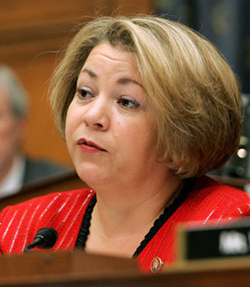November 23, 2009
Published in the Huffington Post
by Han Shan
Chevron is piling on the lobbyists and PR firms in an extraordinary effort to evade responsibility for its massive toxic contamination of the Ecuadorian Amazon.
But in a recent article for Politico, Kenneth Vogel, who tracks the confluence of money, politics and influence for the influential Washington news outlet, writes that the oil company’s increasingly combative approach is backfiring, “drawing fire from environmentalists, media ethicists, state pension funds, New York’s attorney general, members of Congress and even Barack Obama when he was a senator.”
Facing the possibility of a $27 billion judgment in an Ecuadorean court, Chevron is employing an increasingly aggressive kitchen sink strategy, with a major lobbying effort in Washington, and a multifaceted PR campaign in the U.S. and Ecuador that produced a phony news report and promoted a contrived bribery scandal to smear the plaintiffs in the lawsuit.
In DC, Chevron has been lobbying Congress and the U.S. Trade Representative to threaten Ecuador’s trade preferences under the Andean Trade Preferences Act in order to pressure Ecuador into intervening in the private lawsuit. In a shocking admission, Chevron spokesman Kent Robertson explained, “If we were able to call a timeout and make the lawsuit disappear, then this entire issue disappears.”
Among Chevron’s cabal of high-powered lobbyists are Mickey Kantor and Carla Hills, former U.S. Trade Representatives who are lobbying their former agency, Wayne Berman, Managing Director of Government Relations for Ogilvy Worldwide and former National Finance Co-Chair of John McCain’s 2008 presidential campaign, former Senators Trent Lott and John Breaux, former U.S. ambassador to Ecuador Peter Romero, Mac McLarty, President Clinton’s former Chief of staff, and Brian Pomper, former staff director for Senator Max Baucus.
 Last week, U.S. Congresswoman Linda Sanchez (D-CA) excoriated Chevron’s tactics in testimony before the House Ways & Means Trade Subcommittee. She testified that the company is engaging in “a lobbying effort that looks like little more than extortion.” Interviewed for the Politico.com article, she accused Chevron of “trying to leverage our trade policy in order to get a lawsuit dismissed that is currently pending before the Ecuadorean court. It is a way of trying to undermine the rule of law, and I just find that completely abhorrent. It’s shocking.”
Last week, U.S. Congresswoman Linda Sanchez (D-CA) excoriated Chevron’s tactics in testimony before the House Ways & Means Trade Subcommittee. She testified that the company is engaging in “a lobbying effort that looks like little more than extortion.” Interviewed for the Politico.com article, she accused Chevron of “trying to leverage our trade policy in order to get a lawsuit dismissed that is currently pending before the Ecuadorean court. It is a way of trying to undermine the rule of law, and I just find that completely abhorrent. It’s shocking.”
Chevron is the largest corporation in Representative Sanchez’s home state of California, and she is currently circulating the first of three letters to colleagues about what she describes as Chevron’s “very heavy-handed” and “misguided” approach to the case.
But as Politico.com noted, she’s hardly the first or most influential government official to speak up on the issue. In February 2006, Barack Obama joined fellow Senator Patrick Leahy in writing a letter to then-U.S. Trade Representative Rob Portman.
They write:
“Chevron is reportedly lobbying Members of Congress and your office to use the leverage of the Andean Free Trade Agreement to pressure Ecuador to dismiss the case. A Chevron spokesman expressed the company’s “present opposition to the inclusion of Ecuador in the Andean Free Trade Agreement until the government of Ecuador honors its existing contractual obligations and respects and upholds the rule of law with respect to our interests.”
The letter goes on to say:
“We are writing to seek your assurances that the U.S. Trade Representative will not allow negotiations Over the Andean Free Trade Agreement to interfere with a case involving Chevron that is under consideration by the Ecuadorian judiciary, particularly one involving environmental, health and human rights issues that have regional, importance. While we are not prejudging the outcome of the case, we do believe the 30,000 indigenous residents of Ecuador deserve their day in court.”
According to opensecrets.org, Chevron has spent $77,199,296 on lobbying the federal government from 1999-2009. While this is a staggering amount of money, it appears to be an excellent investment for a company that made about $24 billion in profits last year. According to the California Secretary of State, its California state lobbying expenditures add up to nearly $12 million since 1999, not counting the $35 million it spent to help defeat Proposition 87 , a 2006 state ballot initiative that would have increased taxes on California oil producers in order to fund research and development of renewable and clean energy.
, a 2006 state ballot initiative that would have increased taxes on California oil producers in order to fund research and development of renewable and clean energy.
Chevron’s “Human Energy” ad campaign seeks to portray the oil giant as a friendly, environmentally-conscious neighbor in California, and wherever the company operates. But behind the slogans and smiling faces is a behemoth that is aggressively throwing its considerable weight around in Sacramento and Washington, seeking to undermine the rule of law and deny the indigenous residents of Ecuador “their day in court.”
We need to build a people power campaign that will mobilize our representatives — like the courageous Linda Sanchez — to push back against the influence of the Big Oil lobby. In solidarity with the rainforest communities of Ecuador, and all communities where Chevron and its allies seek to put profit ahead of people and the planet, we must say “no more.”
For more on Chevron’s ‘Chernobyl in the Amazon’ and the Clean Up Ecuador Campaign, visit www.ChevronToxico.com